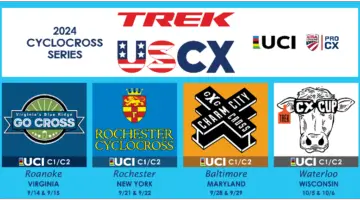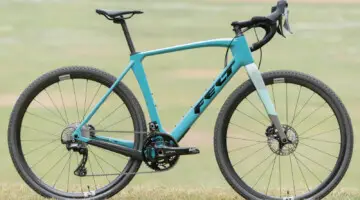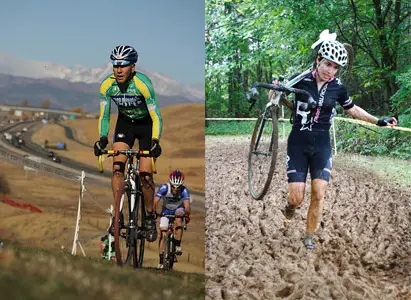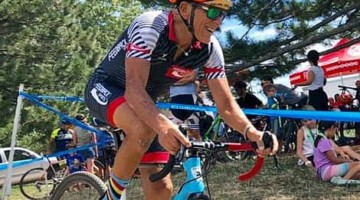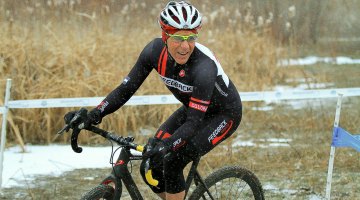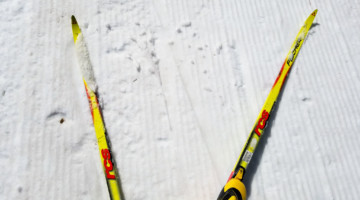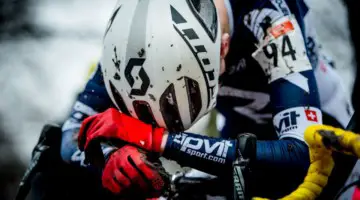From the “Girl with the Cowbell Tattoo” to the philosophical Master’s racer extraordinaire, we bring you a new meeting of the minds. When Lee Waldman approached me (Molly) about doing a “conversation” column together, I immediately thought it was a great idea. After all, he lives across the country from me, we have a large age gap (sorry, Lee!) and of course, a different view when it comes to discussing gender and racing. Not to mention, with Lee in Colorado and me on the East Coast, we’ve both been peripherally involved in a lot of changes with the UCI, USA Cycling and cyclocross in general in the last few years.
Today, we’ve started by better introducing ourselves: it turns out that while we read each other’s columns, we didn’t know as much about each other as we thought we did. The conversation shifted into cyclocross policies and USA Cycling, a topic seldom touched upon, but important for all racers.
We want this conversation to be a starting point: we’ve asked each other some questions, offered some opinions, and now we want to hear yours in the comments or on the Cowbell forums. And of course, if you have any cyclocross issues that you’d like to see us tackle, let us know.
Lee: So, Molly, I’ve been doing a lot of thinking about this idea of ours, of inviting readers into our conversations about ’cross. It’s kind of a weird experiment that we’re embarking on here because we’ve actually never met in person. I feel like I know a bit about you from your writing and from the emails that we send back and forth, but I don’t really know you the way that I would if we had time to have coffee or go for a ride together. So, maybe that’s a good place for us to start. Who are you, really? I know that you and your dad are close, I know that you and I share a passion for ’cross, and I know that you’re a writer who is struggling with deciding if and when she might go back and finish your Masters degree. Do it! You won’t regret it.
Molly: I know what you mean. Cycling is like this a lot now, thanks to the Internet. I feel like I have friends pretty much everywhere in the country (and even most continents), but when it comes to actually saying that I “know” them, it doesn’t quite ring true. I know how most of them – yourself included – race and what they do for a living outside of racing bikes. But you’re right, without that coffee-and-a-ride, it’s not quite accurate to say you know someone. As far as who I am, in a sentence, I’d say I’m a workaholic writer/editor with a massive penchant for bike racing and all of the “scene” that goes along with it. I also, as you rightly pointed out, think my dad is awesome, and while I’m halfway to a Masters in English Education, I doubt that I have the patience required for teaching, and I think you’re a saint for doing it!
I’m in the same boat when it comes to not knowing much about you, other than your history as a racer and the fact that you teach and dig mountain biking. What got you into cycling to begin with? How do you find time between teaching and riding to write the columns you do for us?
Lee: I started cycling way back when I was a young buck because I was a skier and it was the thing to do. I started racing because my cousin was into bike racing and she got me to try a small citizens’ race. Like most of us who are still toeing the line, I was hooked from then on. That was 31 years ago. I’ll never understand why I stuck with it, because I really sucked at the beginning. It took me two years to finish a Cat. 4 race without getting lapped. ’Cross was the same way. I knew it was for me from the beginning and I just kept at it until I learned. I started my day at school today talking with my students about what we’re calling Habits of Mind, those ways of thinking that make us who we are. We’re trying to develop responsible young adults in our school, and changing the way that they think is part of it. That’s kind of a long-winded way for me to begin to answer your question. I find the time to do everything by, number one, being persistent. I’m a stubborn cuss most of the time and when I find something, like cycling, that I’m passionate about, I don’t give myself the option of opting out. I think I’m just hard wired that way because I’ve been the same for my entire life. Whether it was competitive swimming in high school, teaching skiing after college, making it through a J.D. and a Masters, or hanging in as a bike racer through all of the failures that I experienced as I learned, I just refuse to quit. I’ve also learned that I need to do things one step, sometimes painfully small, at a time. If I didn’t truly love the training, the racing and the writing about it, I wouldn’t be able to. But, like you, I just love it. Besides that, sleep is highly overrated.
With those introductions taken care of, I don’t know your politics. When I say that I’m not referring as much to the politics of our country, but to the politics of bicycle racing. Coming from Colorado, I have a relatively skewed view of USAC and what their commitment is to the rank and file of bicycle racing. Maybe that’s the place to start at least for now.
What do you think about USAC and its commitment to ’cross? I’m thinking specifically of the decision this year to hold Nationals in Madison. I hope I don’t step on anyone’s toes here, but I’m thinking that numbers will be way, way down this year because of that decision. None of us started racing ’cross because we wanted to work on our tans, but for those of us in the “lower” categories, the ones who race at 0-Dark-Thirty in the morning, we’re pretty much guaranteed conditions at least as miserable as the first year in Kansas City.
Molly: Honestly? I struggle with this question a lot, especially since it seems like the only thing I hear about it when I interview racers is, “Oh crap, it’s gonna be cold.” When almost no one has anything good to say about it, or nothing that isn’t tempered by some bad, I think there’s a problem. Sure, Bend, Oregon, last year was chilly, but it was near Portland and on the West Coast so for some, it was easy access. The only plus about Madison for me is that in 15 hours, I can drive there. All of that being said, from what I understand, there was only one equally cold place that bid for the right to host Nationals, so it’s as much about the cycling community needing to step up as it is the USA Cycling Committee making sure people are aware of that fact. I think if places had known that they could host and help avoid Nats in sub-zero temperatures, we might have seen a different outcome.
Lee: I live in a state where we are pretty much independent from the USAC. We always have had our own racing association, permitted, sanctioned and insured our own races. It works well for us and we have a really full ’cross schedule every year. This year our calendar has over 25 races on it from September 10th to mid-December. If I had to depend on USAC races I would only have three or four over the entire season. So, they’re a non-entity to me.
Molly: Wow, coming from a triathlon background, I can’t even imagine that! Triathlon has the USAT, and every single race I’ve ever done has been sanctioned by them – I’ve never heard of one not being a USAT race. That said, I do think Colorado has a good model. Whether it’ll continue to work is a big question, since the USAC could make life pretty difficult if they wanted to, as far as Nationals and qualifying for things goes. I think in general, in my area, they’ve done good things, and I’ve never run into any problems with them. My question for you is, what do you think they should do to improve cyclocross in the US?
Lee: I think that they have to start by recognizing the growth in popularity of cyclocross at ALL levels, not just the Elites. Just look at the Juniors for example. If those kids want to get European experience in ’cross, they need to make it to Geoff Proctor’s ’cross camp, paying their own way. So, the first step would be to find some money to start to develop those talented Juniors so that the financial burden wasn’t shouldered by their parents alone. That’s the way to grow the sport and begin to create an impact in Europe. As a Masters racer I can’t complain because I’m not the future of the sport. For those riders who have the talent, they deserve the opportunity and they deserve the support from USAC. I think that would be a great place to start.
What do you think of USA Cycling’s policies on cyclocross? How can they improve and expand cyclocross in the US, and how can we help? Let us know in the comments, and if you have a topic you’d like to see tackled, let us know that as well.










